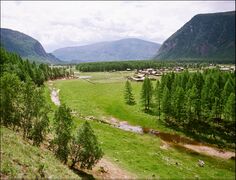Canpei: Difference between revisions
mNo edit summary Tag: 2017 source edit |
mNo edit summary Tag: 2017 source edit |
||
| Line 149: | Line 149: | ||
During the wars of reclamation by the [[Daxia|Zhong dynasty]], Brink and its dependencies supplied a great deal of resources and manpower to the armies of the [[United Cities]], with the Warmaster who fought the second invasion to a standstill being of Brink's Huoxi clan. The deterioration of the [[United Cities]] ruling class into despotism and debauchery, the degeneration of its armies into mobs of armed slaves with no morale and conflict between the cities marked the entry of the confederation into a terminal spiral that would see it conquered in the third Zhong invasion. As the furthest from the frontier, Brink was one of the last major cities to come under attack, being starved into submission in 1215. The Huoxi clan was exterminated and almost half of the city's inhabitants expelled from the city. For the next hundred years Brink would become nothing more than a frontier outpost and backwater. | During the wars of reclamation by the [[Daxia|Zhong dynasty]], Brink and its dependencies supplied a great deal of resources and manpower to the armies of the [[United Cities]], with the Warmaster who fought the second invasion to a standstill being of Brink's Huoxi clan. The deterioration of the [[United Cities]] ruling class into despotism and debauchery, the degeneration of its armies into mobs of armed slaves with no morale and conflict between the cities marked the entry of the confederation into a terminal spiral that would see it conquered in the third Zhong invasion. As the furthest from the frontier, Brink was one of the last major cities to come under attack, being starved into submission in 1215. The Huoxi clan was exterminated and almost half of the city's inhabitants expelled from the city. For the next hundred years Brink would become nothing more than a frontier outpost and backwater. | ||
===Imperial rule=== | ===Imperial rule=== | ||
[[File:MongolCavalrymen.jpg|thumb|[[Degei Confederation|Degei]] mounted archers in the service of the Prince of Guangbei in a hunt.]] | |||
Reorganized as a frontier military province under the name of Guangbei, the region began to gather the renewed attention of central authorities due to the military advances of the [[Oduniyyad Caliphate]] successor states in western [[Audonia]] and the fall of the reconstituted Nasrid state, which was under vassalage of the [[Daxia|Zhong dynasty]]. Hundreds of thousands of settler families were moved into the province to reinforce its defenses, quickly tilting the demographic trends against the original nomad inhabitants who ended up almost wholly absorbed by the newcomers. The fall of the new kingdom of Nasrad in 1278 turned Guangbei into an active front against the [[Ghanim]] sultanate and an imperial army was stationed there on a permanent basis. Most of the province west of the Hongse was once again devastated in the first Zhong-Ghanim war which saw Muslim forces push east up to the river before their crossing attempts were defeated. At this point the province of Guangbei became an hereditary appanage of Emperor [[Huichen]]'s only full blood brother, Prince Tao. As ruler of Guangbei, Tao also had command of significant military forces to protect the western and northern borders of the empire from invading forces circumventing the Arik mountains to the south and attacking through the flat plains. The rule of Tao and his descendants over the province brought much development to the localities under their possession, a royal paved road was built from Sui province in the south all the way to the old lands of the Liang in the far north and a system of ferries were built to traverse and ferry goods via the Hongse river. Many stone bridges were constructed across and forts built on both ends for defense and customs checks during this period. Over the years the court of the Princes of Guangbei also began to adopt some of the cultural practices of the [[Degei Confederation|Degei]] and 'Northern Daxian' peoples that were their subjects, for example they adopted as one of their titles the [[Degei Confederation|Degei]]'s Atabeg and certain Liang fashion styles. In general the Princes of Guangbei were faithful to the imperial center even as their original Zhong blood diluted over time. By the fall of the Zhong dynasty, the old loyalty was frayed and there was only a desultory act of support for the Zong against the rising tide of the Qian dynasty. When Qian messengers arrived at [[Brink]] to demand the submission of Guangbei, the Prince Tong acquiesced without fuss, an act which the Qian rewarded with confirmation of his position and a scepter of carved jade. | Reorganized as a frontier military province under the name of Guangbei, the region began to gather the renewed attention of central authorities due to the military advances of the [[Oduniyyad Caliphate]] successor states in western [[Audonia]] and the fall of the reconstituted Nasrid state, which was under vassalage of the [[Daxia|Zhong dynasty]]. Hundreds of thousands of settler families were moved into the province to reinforce its defenses, quickly tilting the demographic trends against the original nomad inhabitants who ended up almost wholly absorbed by the newcomers. The fall of the new kingdom of Nasrad in 1278 turned Guangbei into an active front against the [[Ghanim]] sultanate and an imperial army was stationed there on a permanent basis. Most of the province west of the Hongse was once again devastated in the first Zhong-Ghanim war which saw Muslim forces push east up to the river before their crossing attempts were defeated. At this point the province of Guangbei became an hereditary appanage of Emperor [[Huichen]]'s only full blood brother, Prince Tao. As ruler of Guangbei, Tao also had command of significant military forces to protect the western and northern borders of the empire from invading forces circumventing the Arik mountains to the south and attacking through the flat plains. The rule of Tao and his descendants over the province brought much development to the localities under their possession, a royal paved road was built from Sui province in the south all the way to the old lands of the Liang in the far north and a system of ferries were built to traverse and ferry goods via the Hongse river. Many stone bridges were constructed across and forts built on both ends for defense and customs checks during this period. Over the years the court of the Princes of Guangbei also began to adopt some of the cultural practices of the [[Degei Confederation|Degei]] and 'Northern Daxian' peoples that were their subjects, for example they adopted as one of their titles the [[Degei Confederation|Degei]]'s Atabeg and certain Liang fashion styles. In general the Princes of Guangbei were faithful to the imperial center even as their original Zhong blood diluted over time. By the fall of the Zhong dynasty, the old loyalty was frayed and there was only a desultory act of support for the Zong against the rising tide of the Qian dynasty. When Qian messengers arrived at [[Brink]] to demand the submission of Guangbei, the Prince Tong acquiesced without fuss, an act which the Qian rewarded with confirmation of his position and a scepter of carved jade. | ||
===Modern era=== | ===Modern era=== | ||
Revision as of 05:07, 29 June 2024
This article is a work-in-progress because it is incomplete and pending further input from an author. Note: The contents of this article are not considered canonical and may be inaccurate. Please comment on this article's talk page to share your input, comments and questions. |
Republic of Canpei 新都共和国 | |
|---|---|
|
Flag | |
Motto: 天空下团结 | |
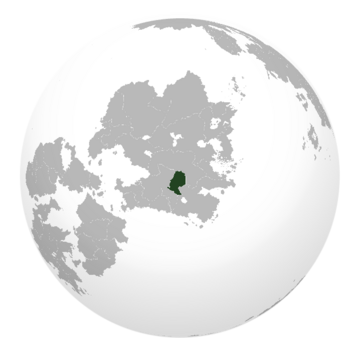 | |
| Capital and largest city | Brink |
| Official languages | Canpei |
| Recognised national languages | Daxian |
| Ethnic groups |
|
| Demonym(s) | Canpese |
| Government | Presidential system |
• President | Dong Bao |
| Legislature | High Council of State |
| Establishment | |
• Liang civilization | 15th century BCE - 3rd century CE |
• Daxian settlement | 520 CE |
| Population | |
• 2025 estimate | 32,152,365 |
| GDP (PPP) | estimate |
• Per capita | 26,624 |
| GDP (nominal) | estimate |
• Total | 856,032,123,541 |
| Currency | Daxian Lire |
| Driving side | right |
Canpei, oficially the Republic of Canpei (Daxian:新都共和国) is a country in southern Audonia. It borders Rusana and Daxia to the south, Huoxia to the east and Ankivara to the west. The name Canpei can be roughly translated as 'the broad north' as the region was known to the Daxian empires to the south, a sort of last frontier before transitioning to the barbarous, nomadic northern steppes. The capital of Canpei is the city of Brink, which is located roughly in the geographic center of the country, next to the Hongse river. Canpei has a population of around thirty two million people. Canpei has a mixed economy with elements of state dirigisme coexisting with free market capitalism, economic inequality is one of the highest in the world. Most of Canpei's exports use Daxian ports and the nation is very reliant on remittances from Daxia. Canpei is a presidential republic consisting of eleven provinces. Canpei is classified by the International Liberty Index Foundation as a flawed democracy with worrying downward trends on issues such as corruption, speech and media freedoms and free and fair elections.
Canpei's history is deeply enmeshed with that of its southern Daxian neighbor as the latter began expanding into the area in the early 8th century. Expansion into the plains was slow at first but gathered pace as nomad tribes were either pushed further north or brought to heel by military or diplomatic means.
Etymology
Canpei is a bastardization of the word Guangbei, which is a Daxian term that means "broad-north". The region got its name for the seemingly endless plains and for the fact that for hundreds of years it was the northernmost limit of Daxian regional influence.
History
Prehistory
Canpei has been settled since prehistory, with some archaeological evidence suggesting that early hominid inhabited the region two million years ago. Fossils of early man were found in few places, but mostly of teeth or small bone fragments, making it hard to identify with any precision the exact species and their dating has frustrated experts since their discovery. The Puhusui Cave in Baitian province shows well preserved red ochres and brown paintings of horses, oxen and lynx dating to approximately eighteen thousand years ago and are proof of a thriving Upper Paleolithic culture in the region.
Liang Civilization

In the 15th century BCE, the plains of the north and east were home to many different tribes who shared a common culture and waged small scale wars against each others for land or over specific feuds. One of those tribes, the Paozi, settled at the foot of the mountains were they could grow rice and keep large herds of goats. The Paozi tribe are thought to have migrated the area after being pushed out of the state of Sui in modern-day Daxia. Over time the Paozi subsumed other regional groups through alliance or conquered them to acquire more pastural and agricultural land until their territory spread from the valleys of mount Zhemei to the floodplains along of the Hongse river. The Paozi were ruled by a chief elected from among their nobles and for the first two hundred years or so of their existence, that system served them well, but a few families with more land started to gain more and more influence until one of them became de facto ruler of the tribe. Around 1090 BCE, we have the first documented usage of the title of king to describe the leader of the Paozi tribe found on bamboo slips discussing the exchange of five hundred heads of goats to secure the marriage of King Lioliotzu of Paozi and Fei of Qungde. The Paozi kingdom is traditionally dated from 1100 BCE to 800 BCE. Their disappearance from historic records coincide with a period of great politic instability and the rise of many states in the region.
The first undeniable proof of a unified civilization are of the Kingdom of Suizung around 750 BCE and expert generally agree that they were likely a successor state of the Paozi based on their near identical language and culture. They ruled over the eastern shores of the Emerald Grass Sea and the northern plateau. Their rule mark the beginning of the unification of the various tribes into what would be become the Liangs as we know them today. The Suizong dynasty wouldn't last long, crumbling after the death of the second king, but their kingdom would not fall and instead pass to other houses who would have various levels of success at maintaining and expending their control. Around 475 CE, the Siaodo dynasty would die out and a short civil war would see the Yuesun dynasty establishing itself has the new rulers of the Liang. Yuesun ascension would signify the beginning of a rapid rise of Tianism to the status of dominant religion of the the region and an aggressive expansion west, pushing the boundaries of Liang civilization all the way to the edge of the western plains. A series of military campaigns would be launched against the warring states of the flatlands over the centuries of their rule, none with great success, setting the borders of the Liang civilization firmly along the Dadu river in the north and the foothills of the Yellow Plain in the south. The Liang kingdom is recorded has having extensive relations with the Xie dynasty to the south, the latter controlled most of the territory of old Sui that abutted Liang lands. Large fortresses would be erected along the border to protect the hard earned gains of the kingdom and the focus of succeeding rulers shifted slowly away from military matters to art, culture et religion. Many painting, sculptures, poems and other pieces of art who survived to this day are held as national treasures. Over the centuries, through the neglect of increasingly aloof kings, the Yuesun dynasty would fade into irrelevance, leaving strong regional governors to erode what little control they held away until the fracturing of the Liang kingdom in two pieces roughly split between the north and south. This division would last from 63 BCE to 198 CE, sometime fracturing even more only to reunite.
The southern kingdom remained especially resilient, keeping mostly in one piece during that century and a half under a revolving door of generals and nobles which earned it the nickname of Kingdom of a Thousand Dynasties. By this time the Daxian Xie dynasty had collapsed and broken up, so there was no true danger from further south. Meanwhile, the north kept dividing into smaller pieces until the late 2nd century and war was endemic to the region. Amongst the chaos, many turned to the solace of religion and especially toward Tianism, a school of thought advocating for radical change and teaching that inaction when faced with chaos was tantamount to creating chaos yourself. Under the leadership of monks, peasants of the Raotuan kingdom in modern day Beifang rose in rebellion, quickly taking over and moving across the north where more and more people rose against their tyrannical king. In 195 CE, Fen Huotong was proclaimed king, founding the Neng dynasty. The north was unified under his rule quickly after. Most remaining states fearing what would happen to their leading class their peasant should rebel, bowed to the ascendant Neng Kingdom. Despite their resilience, the south's lack of political stability led to an easy conquest by a deeply motivated northern army. By 198 CE, the old territories of the Yuesung were united again at long last. Under the Neng, Tianism took a central place in politics and the deeply spiritual style of rule would come to define the Liang for their entire history.
Daxian Encroachment
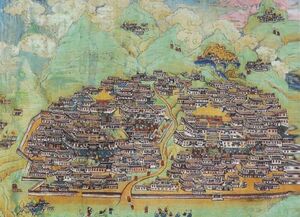
By the time the Liang kingdom was reunifying under the leadership of northern elites, the Shang state was leading its own efforts to reunify the lands of the old Xie dynasty. The very first attested instance of Daxian habitation of the Guangbei plains to the north is from an Shang dynasty imperial proclamation in 220 CE; granting official town status to the city of Brink which sits at the southern mouth of the Hongse river. Imperial surveyors traveled northbound along the eastern bank of the river encountering small nomadic settlements, its people probably related to the Degei tribesmen living across the river. Imperial authorities erected five wooden forts alongside the river to serve as frontier posts, this territory would be known thereafter as the Right-Bank Frontier province with Brink serving as its first seat. Brink and its hinterlands were dominated by the Houxi clan, linked by marriage to the Imperial family by marriage to a second cousin of the Emperor Cao Mei. The Houxi were thus the beneficiaries of imperial patronage and their province received generous subventions that it otherwise would not be granted given its low population. From 803 CE onwards the Houxi held a monopoly on the office of Imperial Viceroy. It was Viceroy Chang Houxi who first ordered an expedition be mounted across to the other side of the Hongse into what is known as the Koron forest, where Huoxi began setting up numerous logging camps. The exploitation of forested areas became an important source of revenue for the Houxi family who built a palisade and town named Hochi across the river to serve as the logistic center of the operation. The lands ruled by the Huoxi served as advanced posts of Shang dynasty expansion into the Guangbei plains.
Shang officials regarded the southern lands held by the Liang kingdom as Shang territory, they held that as the conquerors of Old Sui, the lands belonged now to Shang. A long epistolary conflict occurred for an entire year, with officials on both sides trading both legalistic arguments and barbs by letter. When one Liang minister undiplomatically referred to the Shang emperor as a cow in heat, war became inevitable. By this point the Shang dynasty had subjugated all of the Daxian heartlands and possessed a large and well seasoned army. From its base in the southern Guangbei plains, Shang dynasty forces ravaged the southern Liang lands and incorporating all of the territory previously managed by the Neng dynasty. The northern part of the kingdom which was divided into several dozen semi-independent commanderies was definitely conquered by 825 through a combination of bribery, marriage alliance and short sieges. Part of the Liang kingdom was administratively absorbed into the Right-Bank Frontier province and ruled from Brink while the lower third was reorganized into Sui province. The region held special importance due to the conquests of the Oduniyyad Caliphate, which advanced to the borders of Guangbei which required the Chen dynasty to expend precious resources to garrison the border and the as of yet fairly depopulated province. The crumbling of Oduniyyad central authority in Audonia during 860 brought no respite as the new Muslim dynasties that filled in the power vacuum proved equally inclined to wage holy wars as a method of cementing their legitimacy. Parts of the territory west of the Hongse exchanged hands several times, as a result some settling of Muslim peoples took hold.
United Cities era

Generalized unrest within the Chen dynasty began in 877 with a series of would be usurpers, collectively known as the Four Great Impostors. The most powerful of this was a nobleman by the name of Tengu Peg-Leg who took control over the city of Heng. His rebellion spread like wildfire across the north and Brink's Huoxi clan were among the first noble families to pay him homage. Tengu's assassination marked the end of his Northern Shang state and its transformation into the confederation of the United Cities, of which Brink and its environs were a founding member. In this period the city of Brink and functioned as a mostly independent city-state and all the territory in the northwest of the United Cities was under its hegemony. The practice of slavery was imported from Heng and the Huoxi clan became one of the great slaver families of the region, taking people into bondage from far and wide. Under the loose coalition of cities, taxation was much lower than under Imperial rule, boosting the economy of the city. Brink-Bianyuan began establishing colonies and cities across modern day Canpei to feed itself and source whatever it could not acquire locally.
During the wars of reclamation by the Zhong dynasty, Brink and its dependencies supplied a great deal of resources and manpower to the armies of the United Cities, with the Warmaster who fought the second invasion to a standstill being of Brink's Huoxi clan. The deterioration of the United Cities ruling class into despotism and debauchery, the degeneration of its armies into mobs of armed slaves with no morale and conflict between the cities marked the entry of the confederation into a terminal spiral that would see it conquered in the third Zhong invasion. As the furthest from the frontier, Brink was one of the last major cities to come under attack, being starved into submission in 1215. The Huoxi clan was exterminated and almost half of the city's inhabitants expelled from the city. For the next hundred years Brink would become nothing more than a frontier outpost and backwater.
Imperial rule
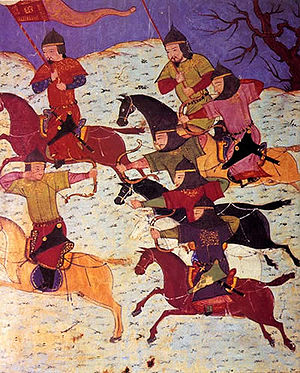
Reorganized as a frontier military province under the name of Guangbei, the region began to gather the renewed attention of central authorities due to the military advances of the Oduniyyad Caliphate successor states in western Audonia and the fall of the reconstituted Nasrid state, which was under vassalage of the Zhong dynasty. Hundreds of thousands of settler families were moved into the province to reinforce its defenses, quickly tilting the demographic trends against the original nomad inhabitants who ended up almost wholly absorbed by the newcomers. The fall of the new kingdom of Nasrad in 1278 turned Guangbei into an active front against the Ghanim sultanate and an imperial army was stationed there on a permanent basis. Most of the province west of the Hongse was once again devastated in the first Zhong-Ghanim war which saw Muslim forces push east up to the river before their crossing attempts were defeated. At this point the province of Guangbei became an hereditary appanage of Emperor Huichen's only full blood brother, Prince Tao. As ruler of Guangbei, Tao also had command of significant military forces to protect the western and northern borders of the empire from invading forces circumventing the Arik mountains to the south and attacking through the flat plains. The rule of Tao and his descendants over the province brought much development to the localities under their possession, a royal paved road was built from Sui province in the south all the way to the old lands of the Liang in the far north and a system of ferries were built to traverse and ferry goods via the Hongse river. Many stone bridges were constructed across and forts built on both ends for defense and customs checks during this period. Over the years the court of the Princes of Guangbei also began to adopt some of the cultural practices of the Degei and 'Northern Daxian' peoples that were their subjects, for example they adopted as one of their titles the Degei's Atabeg and certain Liang fashion styles. In general the Princes of Guangbei were faithful to the imperial center even as their original Zhong blood diluted over time. By the fall of the Zhong dynasty, the old loyalty was frayed and there was only a desultory act of support for the Zong against the rising tide of the Qian dynasty. When Qian messengers arrived at Brink to demand the submission of Guangbei, the Prince Tong acquiesced without fuss, an act which the Qian rewarded with confirmation of his position and a scepter of carved jade.
Modern era
Disintegration of Imperial authority
Independence
Government of National Emergency
Revolution of Dignity
Daxian Intervention
Geography
-
A rural village in the Gonbei region.
-
Highway north to the Tashi-Daypa border.
-
View of the Hongse River, Canpei's most important river.
-
Huoxi valley, near the city of Brink.
-
Orgon steppe zone in southern Canpei, with Arik mountains in the background.
The geography of Canpei is overwhelmingly uniform, almost 90% of its territory being covered by flatlands and steppe. Only the far south features more elevation such as the Arik mountain range that is shared with Rusana and Daxia. This lack of physical barriers has historically placed Canpei in a weak position against external forces who can potentially move at will into its territory.
Canpei is bisected by the Hongse river which is its most important river and water source, with over 70% of its population residing close to it. On its northern border Canpei has a strip of shoreline on Lake Kocho, from which it can draw limited water under an agreement with other countries who share the lake. Canpei is a completely landlocked nation, another unfortunate geographical condition that has manifested in economic dependence on Daxia.
Climate
Most of Canpei can be classified as experiencing a humid continental climate type, with large seasonal temperature differences, with warm to hot (and often humid) summers and freezing cold (sometimes severely cold in the southern areas) winters. Precipitation is usually distributed throughout the year but often does have dry seasons in the northern part of the country. The southernmost regions see some limited snowfall during winter. During summer temperatures can reach 30°C and during winter it can reach as low as 10°C
Government and Politics

Executive
Executive power is held and exercised by the President of the Republic, who is head of the government and supreme commander of the military forces of the State. The president is elected by universal suffrage for a term of six years and he can be reelected for a further two consecutive terms. A sitting president can only be removed from office by a qualified majority in the High Council of State. Successive revisions to the constitution have greatly strenghtened the office, while stripping the legislature of many attributions and tools of oversight. The current President is Dong Bao, elected with 68% of the vote in 2026.
Legislative
Following the formation of the government of national emergency, the lower house was abolished and all its powers and duties were transferred to the High Council of State. The council is the nation's sole legislature, composed of six hundred members. Of these, a third are chosen by the sitting president, 330 are elected by direct vote of the population and the remaining 70 are elected from proportional lists according to each parties voting results. All members of the council serve for five year terms and there is no limit on how many terms a legislator can serve. Current criticism of the legislative focuses on its submission to the executive under the current system of dominant party, moreover the abolition of the lower house removed more of the safeguards of plurality and against undue accumulation of authority by the executive.
Politics
The National Union of Canpei(NUC) is the largest and oldest party in the High Council of State. An avowed conservative party, it leans towards traditional values and moderate state intervention in economic affairs. However unlike typical conservative parties, the NUC does not heavily feature nationalist themes in its ideology. After the Daxian invasion that restored it into government, the party 'sanitized' its foundational documents and adopted an almost subservient direction to Daxian priorities. The NUC has a two thirds majority on the High Council. Opposition to the ruling NUC comes from a variety of smaller parties such as the centrist Party of the Democratic Center and the leftist Broad Leftist Front. Both of these parties are under constant political and judicial pressure, losing their party registry several times, having some of their leaders and lawmakers arrested under various charges such as 'slandering the judiciary'. Another smaller party that has gained in popularity with some sectors is the Unification Party, its main goal being unification with Daxia, for reasons of historical ties and claims that Canpei would be much better off economically in a real union with its southern neighbor.
Provinces
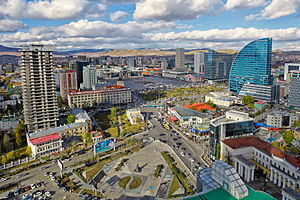

| Name | Population | Capital | Number of representative |
|---|---|---|---|
| Baodian (宝殿省) | 41,749,947 | Yichang (仪场市) | 79 |
| Liangyu (亮域省) | 37,009,762 | Gongcheng (宫城市) | 70 |
| Xieshui (谐水省) | 32,912,585 | Weichen (卫琛市) | 62 |
| Shanliu (山路省) | 23,932,378 | Baiqiang (白墙市) | 45 |
| Nonglin (浓林省) | 20,599,603 | Qianjing (潜京市) | 39 |
| Beifang (北风省) | 16,233,832 | Hairong (海荣市) | 31 |
| Kaiming (凯溟省) | 7,509,316 | Wumen (乌门市) | 14 |
| Biansai (边塞省) | 7,150,026 | Xidian (西电市) | 13 |
| Jizhou (脊陬省) | 5,903,885 | Gaocheng (市) | 11 |
| Baitian (白田省) | 1,891,735 | Quiangyuan (强远市) | 4 |
| Zhuihei (追黑省) | 1,637,194 | Fengbao (风堡市) | 3 |
| Name | Population | Capital | Number of representative |
|---|---|---|---|
| Touxian (头县) | 12,148,743 | Zhenghe | 23 |
| Zhouxian (撙县) | 18,971,130 | Shanjing | 36 |
Demographics
Ethnicity
Ethnic origin of respondents in the national census (2026)
Tiao: The majority group in Canpei is a group of people called Tiao, which is a term that only distinctly emerged in the mid-1800's. Roughly signifying 'northerners', the Tiao are assumed to be comprised of the descendants of Canpei before the Zhong reconquest of the province, that is the original Daxian settlers who intermixed with the native nomad populations and Liang peoples. Those that came after the fall of the United Cities were traditionally seen as colonizers and treated with suspicion since they displaced the locals from most positions of power and influence. The independence movement and first governments of Canpei were dominated by the Tiao but after the Daxian invasion, policies that disadvantaged other groups were dropped. Daxian anthropologists do not recognize the Tiao as a distinct group, instead using the term of Plains Daxian.
Daxian: For political purposes, the Canpei government separated part of its population from the main Tiao group after independence. Those whose descent did not go back far enough in time were barred from self-identifying as Tiao and therefore had less standing before the state. This system of tiered citizenship eventually became intolerable for Daxians on both sides of the border, leading to the collapse of the post-independence government by armed force. Today pure Daxians are just over 20% of the population, have equal standing to other ethnic groups and due to their connections to Daxia, are a very significant economic and political force.
Xingkai: The Xingkai are a mongolic ethnic group that are native to northwestern Canpei who are speakers of the Xingkai language. They constitute the largest indigenous group in Canpei. Traditionally semi nomadic herders, around one third of Canpei's Xingkai people still maintain this lifestyle. The rest of their group inhabit the northern provinces where they form the majority of the population.
Other: The Other category includes Muslim Rusanis who migrated to Canpei during the Rusani civil war and their descendants.
Language
As a reflection of Canpei's ethnic makeup, there are various languages that are in use among the population. The constitution of the country specifies two languages as the official ones: the Liang language, which is recognized by most scholars as a dialect of Daxian and is mostly mutually intelligible with said language; Daxian scholars call the Liang dialect 'Northern Daxian'. The second official language is of course, Daxian itself which is spoken by the Daxian minority and a great many Tiao people. One of the characteristics that sets the two dialects apart is Liang's greater user of Xingkai loanwords. As for unrecognized languages or with regional status at best, the language of the Xingkai has recognition in 3 provinces, Rusani is not recognized but is a lingua franca of the Muslim community.
Religion
Religious affiliations in the 2030 census
Tianism is, by a small margin, the largest religious denomination in Canpei, amounting to 33.4% of the population in 2030. Being that the birthing place of Tianism was the ancient Liang kingdom, many in Canpei hold it as a sort of national faith. Tianism is strongest among the Tiao ethnic group, who are also the largest ethnic group. Some smaller communities of Tianist Daxian's exist, mainstream Daxian assumptions are that Tianism is an exclusionist 'northerner' set of beliefs.
Christianity is the second largest religious group, comprising 28.4% of the population in 2030. Christianity is concentrated in people of Daxian and Xingkai origin, geographically the distribution of Christians is heaviest in urban areas and in the sparse northwest. The vast majority of Canpei's Christians belong to the Christian Church of the East based in Daxia, the highest official of the Church in Canpei is the Archbishop of Bianyuan. Only around 7% of the Christian community belong to the Audonian Church of the East.
Adherents of Islam constitute the third largest religious group, comprised of 13.6% of the population in 2030. Canpei's sizable Muslim community are either the descendants of settlers brought by the Oduniyyad during their brief rule of the western bank of the Hongse river, or they are more recent economic migrants from Rusana; converts are as of this time a small minority. The majority of Canpei's Muslims are overwhelmingly Sunni with small pockets of Shi'a and Qustantis. Muslims are concentrate on the west bank and the capital of Bianyuan.
The number of irreligious people or atheists has been growing in recent decades, as of 2030 24.6% of respondents self-identified as having no religion at all. Disillusion with rigid hierarchies, retrograde views, religious extremists and various prohibitions are causes that continue to affect the decline of religious affiliation in Canpei.
Culture and Society
Canpei's culture is a mix of several distinct influences thanks to its position as a borderland between historic powers. To the south and east lay the millenarian culture of Daxia which over time colonized the area and imprinted its culture and language to the native peoples, to the west and southwest were a plethora of Muslim states who tried to spread their faith to the borderlands of Daxia by the sword and sending their own colonists. In the end the first influences and the legacy of the Liang kingdom proved more durable, nonetheless Canpei still exhibits many differences from mainstream Daxian culture in the realms of the culinary, the arts, social mores and a degree of openness that is uncharacteristic further south.
Cuisine

Canpei's cuisine has been developing for millenia from a large number of cultural traditions and geographical varieties, among which the most influencials are Beodian, Liangyu, Beifang and Jixhou cuisines. Strong Daxian and northern Dolong influences have contributed to the width of cooking methods and ingredients which are part of the culinary culture of the country. Mutton and pork are the most popular meat consummed, with beef, chicken and goat being also commonly found. Vegetable are a major part of the diet of the average person, with a large amount of dishes being purely plant based and using bean products such as tofu or soy milk as a protein source.
Traditional meals are notable for the numerous side dishes, xiaocan 小餐, which are served along steamed rice or bread and that tradition and most meals today are surves in many small portions set on the table for all, or are accompagnied by xiancan of spiced vegetables that are steamed or fermented. Canpei's cuisine involve heavy seasoning with ginger, garlic, chili, sesame seed oil and soy sauce. Some well known dishes are:
- Wuyan sui, a barbecued mutton cooked in the Berfang-style and originated from the province of the same name. It's often eaten as a main dish or as a major ingredient for noodle or stir fries.
- Tianzhu, deep-fried pork sautéed with vegetables in a sweet sauce usually made of sugar, white vinegar and ginger.
- Shanjing roasted duck, an old imperial delicacy of the Fù dynasty heavily inspired by Daxian cuisine of the era that have now become a popular dish in the east served during the holiday or on special occasions.
- Huotang, a spicy soup originating from the mountainous region that has become one of the most iconic Yuenan dish. It's made of a rich chili spiced bone broth with rice noodles, a generous amount of pork or goat meat and vegetable.
Fashion
Canpei's traditionnal clothing is the Zongbu (聪布), a long sleeve, colorful dress made of silk dating from the late Liang Civilization period. It is heavily inspired by 2nd century court garments. The many layers of light and loose fiting fabrics were meant to invoke the fluidity of water and air, while keeping the wearer's modesty. A tradionnal Zongbu always include a cross collar, a right-side lapel, a waist sash and ample sleeves. Modern variants often worn during festivals or special events often only have only one to three layers of clothing and can include some modest amount of cleavage, but more expensive and highly tradionnal ones can be made up of as many as 16 layers of fabrics of vibrants colors and complex embroideries. They come in a variety of style and colors, leaving a lot of room for self-expression. It is not uncommon for couple to match their zongbu's color or to choose a smiliar motif. Floral and astral patterns are especially common and viewed as lucky and more desirable. Blue, black, red and white are the traditional colors of this type of dress and will often be a prominent part of the overall design, thought having a monochromatic white zongbu is considered extremely unlucky since the dead are dressed fully in white when cremated.
Economy

Canpei has a gross domestic product of $851 billion, a robust and growing economy despite the disadvantage of being landlocked. Canpei's economy grew by 4.2% on 2030 and the lowest growth in the previous ten years was 2.2 in 2015. Canpei is a mid level income country with a GDP per capita of $26,624. Canpei's most important economic partners are Rusana, Huoxia, Ankivara and Daxia. The country has adopted Daxia's currency to facilitate trading and financial transactions with its most important partner. As it has no independent access to the sea, Canpei makes use of the port of Zong to transport all of its international trade, under an economic compact with Daxia all truckers from Canpei have expedited border passage and custom checks on their way to Zong. Canpei's economy is highly dependent on exports, major products for export include diesel trucks, construction equipment, shoewear, textiles, wind generator technology rubber and agricultural products.
Industry
Canpei's automotive industry has long focused on the production of trucks of various types, so as to not compete with Daxian carmaking firms which are deeply entrenched and have much greater resources. This specialization has allowed Canpei's niche truck companies to grow and prosper in the Daxian market by offering sturdy 6x4 diesel trucks used to haul goods, refuse trucks, concrete mixers and dump trucks among other types. Canpei has defended its internal trucking market by slapping anti-dumping tariffs on foreign vehicles, especially from Metzettan firms. The automotive sector employs over 400,000 people as of 2030.
Another significant employer is the footwear industry, it employs some 150,000 people as of 2030. Canpei produces roughly forty million pairs of footwear between formal shoes, tennis, sandals and slippers. As the demand for sustainable footwear continues to increase worldwide, Canpei is a leading nation in coming up with innovative eco-friendly materials and green shoe production methods. Canpei is also a producer of socks which complements well with its textiles and shoewear production chains, sock market value growth was 0.68% in 2030. Canpei has a proven record as a manufacturing hub for Daxia's firms thanks to low labor costs, educated workforce and integration with its neighbors transport networks.
Energy

Canpei is a net importer of energy at present. Most of its domestic energy production comes from wind generators, which Canpei's flat geography is especially well suited for. Wing energy fulfills at present 35% of the country's domestic energy needs, with enough power generating capacity being planned to come online in the next fifteen years to take that percentage up to 45%. Canpei also has some older coal powered power plants which consume Daxian coal, at present they represent some 12% of the country's energy. The rest of the energy is bought from Daxia, which supplies it mostly from the excess power generated by its nuclear power plants. Daxian supplied electricity is not cheap, but on this regard Canpei does not have many options other than expanding its wind farms. Canpei does not possess significant oil or gas deposits nor does it have the technical capability to employ nuclear energy, neither do its policymakers wish to rely on coal due to policy goals to employ greener energies.
Agriculture and forestry
Canpei is a historical agricultural producer of some importance thanks to the irrigation along the banks of the Hongse river that traverses the country from north to south. As recently as 2000, agriculture supplied 60 percent of employment. In 2020, agriculture and forestry contributed 11.4 percent to the GDP; in rural areas, farm jobs supply about half of employment. Canpei's agricultural exports are successful in foreign markets and the country's farmers have been noted for best practices and sustainable farming. Rice is the most important crop in the country and some 40% of land used for agriculture goes to the planting of rice alone. Tapioca, sugarcane, pineapples, palm oil, bananas and mangos are also crops that are popular with Canpei's growers. Canpei has designated 15% of its land for the timber industry and another 25% as protected forests. Forests have been set aside for both conservation and recreation, and timber forests are available for the forestry industry. Between 1992 and 2010, exports of logs and sawn timber increased from 50,000 to 2,000,000 cubic meters per year.
Military
The Canpei Self Defense Force (CSDF) is responsible for maintaining the country's international borders secure, providing relief in cases of dire natural disasters and aiding in internal order tasks on request of the President. The CSDF is has two components: the Land Forces and the Air Force, there is no navy as Canpei has no access to the ocean, the Land Forces do keep a maritime capacity to operate on the Hongse river. As of 2034 there are 150,000 active personnel in the Land Forces and 8,000 personnel in the Air Force. The CSDF maintains universal conscription of males and females starting at the age of 18, mandatory military service lasts for two years, or three years in case of civic equivalence.
Canpei is committed to the principle of international neutrality in all conflicts and it is constitutionally prohibited for its armed forces to be deployed abroad, even should there exist a mandate by the League of Nations. Canpei even declined a request by Daxia to provide troops for its contingent fighting in Varshan during the Deluge. Canpei does maintain military to military relations with Daxia, the two nations hold joint military exercises on an annual basis and much of the CSDF's equipment is procured with Daxian companies like Diaoyu.

